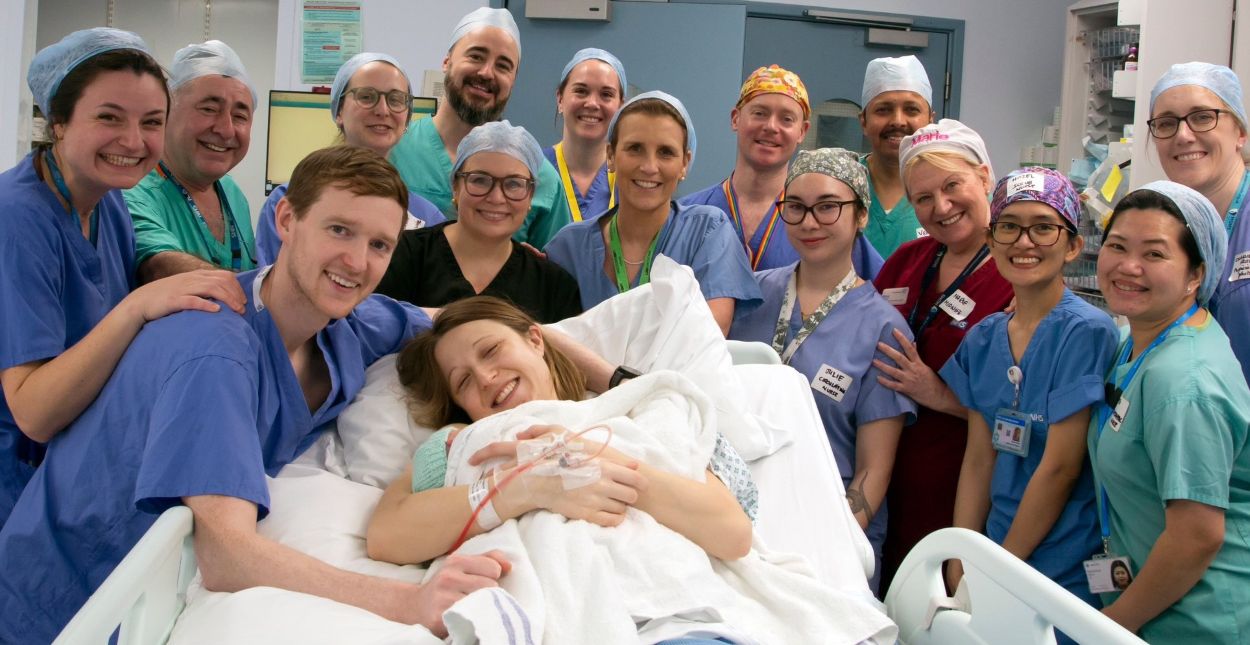In an unprecedented medical achievement in the UK, Grace Davidson, aged 36, who was born with Mayer-Rokitansky-Küster-Hauser (MRKH) syndrome, a rare condition that results in the absence of a functioning uterus, has successfully given birth to a healthy baby girl.
In a groundbreaking 17-hour surgery at Churchill Hospital in Oxford in 2023, Amy Purdie donated her womb to her sister, Grace Davidson.
A little over a year after the transplant, Grace delivered her daughter, named Amy Isabel, via caesarean section on February 27 at Queen Charlotte’s and Chelsea Hospital in London. The baby’s name is a tribute to her aunt and organ donor, Amy, and Isabel Quiroga, the transplant surgeon who led the medical team.
When she first held her daughter, Grace described it as surreal and wonderful. “It was just hard to believe she was real,” she expressed.
A London woman born without a womb has been the first in the UK to give birth after a successful womb transplant.
Grace and Angus Davidson welcomed their baby girl Amy Isabel five weeks ago – naming her after two special women who made this breakthrough possible. pic.twitter.com/or9tfGY0Hw
— Good Morning Britain (@GMB) April 8, 2025Grace and her husband, Angus Davidson, 37, had prepared for this possibility by preserving embryos following fertility treatments. Grace achieved pregnancy on her first attempt at in-vitro fertilization (IVF) following the transplant.
This breakthrough forms part of a clinical trial that Womb Transplant UK manages. The trial has secured authorization to conduct 15 transplants—five from living donors and ten from deceased donors. All medical personnel involved have volunteered their services, and the charity has covered the associated NHS costs.
Professor Richard Smith, who leads the trial, described this birth as a milestone in 25 years of research. “I feel great joy, unbelievable it’s something,” he remarked.
👶 The first baby has been born in the UK to a mother using a donated womb.
The baby’s mum, Grace Davidson, was born without a functioning uterus and received her sister’s womb in 2023.@bbcnuala is joined by Isabel Quiroga, who led the transplant team ⬇️ pic.twitter.com/XN9WQ7IReF
— BBC Woman's Hour (@BBCWomansHour) April 8, 2025Following Grace’s procedure, surgeons in the UK have performed three additional womb transplants using deceased donors. They remain optimistic about broadening access for women who cannot carry children due to the absence of a functional womb. It is estimated that 15,000 women of childbearing age in the UK suffer from similar conditions, with around 5,000 born without a womb.
Amy Purdie spoke positively about her decision to donate, while Grace highlighted the significant impact on their sisterly bond. “It’s a huge act of sisterly love,” Grace noted.
Grace currently takes immunosuppressants to prevent her body from rejecting the transplanted uterus and plans to have one more child before undergoing a hysterectomy to end the medication regimen. Surgeons have confirmed that the risks associated with the medication will return to normal levels once the womb is removed.
Globally, over 135 womb transplants have led to at least 65 births since the first successful case in Sweden in 2014. Grace Davidson’s story now stands as a beacon of hope for women facing similar reproductive challenges in the UK and worldwide.






